Andrea Herrmann Maya Daneva Chong Wang Nelly Condori-Fernandez
Requirements Engineering in Job Offers
Who works in RE and what competences do they need, particularly soft skills?
How is Requirements Engineering (RE) perceived and staffed in practice? What is the job title of the position doing RE? What tasks does this position include? Which qualifications are demanded? The answers to these questions might differ across countries and evolve over time. Therefore, several studies in different countries have analyzed job postings for RE in the period of 2009-2018. The results show that there are still very few job postings for pure Requirements Engineer’s positions. Only about one third of the RE jobs demand specific RE competencies. Instead, about 80% of the RE jobs demand technical knowledge. Almost all job ads include a long list of various soft skills which are deemed important for this position.
How is Requirements Engineering staffed in practice?
Requirements Engineering (RE) is an important activity within software development. However, “requirements engineer” is not necessarily a specific role within a project. Some process models define several roles doing RE (for instance, a business analyst and a requirements manager); or in agile frameworks, the product owner is responsible for the RE. In waterfall models, RE is mainly done at the beginning of the project by a full-time specialist; in other process models, RE is combined with other project tasks. As there might be different ways of distributing RE tasks among project roles, it is interesting to do an empirical study to find out how RE is staffed and executed in practice. One approach for gathering large amounts of data about RE in practice is to analyze the task descriptions and demanded competencies in job ads. Since 2009, several such studies have taken place in different countries and at different points of time. This article gives an overview of their results with respect to the following questions:
- Q1: What is the job title of the position performing RE?
- Q2a: Which further tasks beyond RE does this position include?
- Q2b: How many further tasks does this position include?
- Q3: Which qualifications are demanded?
Ideally, the job ads reflect employers’ previous experience with individuals in RE positions: that is, they demand those qualifications which in the past turned out to be critical in performing RE well in the employer’s organization. Of course, the assumption that the job ads really describe those qualifications which are deemed critical for RE tasks might not always hold. However, we assume that the job ads contain relevant information and give a good overview of what is included in the RE profession. The analysis process we applied on job ads describing RE tasks is described in [1].
In what follows, we first present the answers to the four questions. Then, we discuss the differences found across countries. Finally, we analyze the temporal trend from 2009 to 2018 in Germany and the importance of soft skills in different countries. We also discuss the implications of this study for education and certification.
Answer to Q1: What is the job title of the position performing RE?
Employees are usually employed in positions having a job title, rather than for a specific project role. Their role and tasks in a project team might differ depending on need and competencies. (These terms are defined in [2].)
RE can be executed by a dedicated requirements engineer, but can also be performed by persons in other positions or in other roles.
The job title “Requirements Engineer“ was hardly found in the studies. The percentage of explicit requirements engineer positions among the positions performing RE is below 5% (see the darker blue line in Figure 1). In 2009, in the German study [1], only one job with a Requirements Engineer title was found within a set of 141 job ads; in 2012, there were 3 out of 67 and in 2015 there were 7 out of 149. So, the ratio has risen from practically zero to almost 5% in 2015 [2], but went down to 0.6% in 2018 [3]. Similarly, the 2017 RE job ads research in the Netherlands found that only 2 out of 101 RE job ads used the title “Requirements Engineer” [4]. The 2018 research of job ads in Canada found no jobs with this title at all [5].
The largest group of IT professionals performing RE had the job title of Consultant in 2009, 2012 [1] and 2018 in the German study [3]. In 2015 [2], the largest group of professionals performing RE were the developers. Similarly, in the Netherlands, the majority of job titles performing RE jobs were analysts: business analysts, data analysts and application analysts [4]. In contrast, the study of the RE job market in Canada [5] indicated that companies assume that the job title performing RE includes the word “engineer” (e.g. software engineer, database engineer, security engineer, systems engineer, support engineer); 42% of the RE jobs analyzed in the Canadian study had such a title.
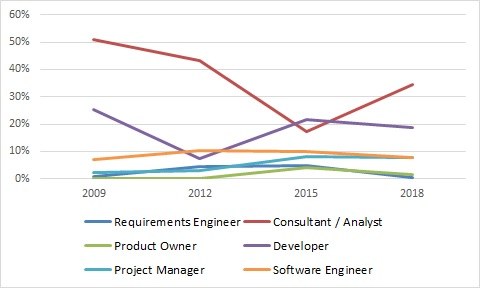
These findings [1,2,3,4,5,6] are consistent with other publications on the positions performing RE in practice that also found that there rarely is a dedicated RE position in the organization. The publication [2] summarizes such studies.
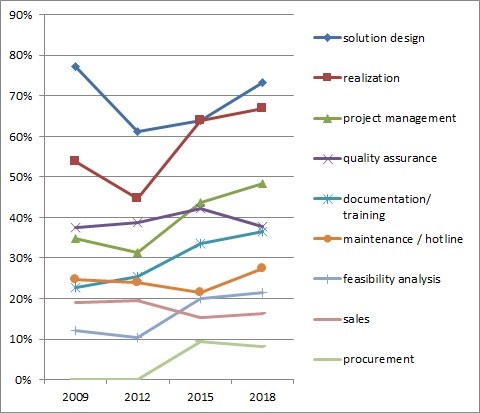
Answer to Q2b: How many further tasks beyond RE does a position include?
In the German study, on average, there were around three of these additional tasks (see Figure 2) mentioned alongside RE activities [1], [2], [3]. In 2015, we found large differences between employees and freelancers with respect to the variety of tasks associated with each group. Among the freelancers, 22% were hired for doing RE exclusively and 20% had only one additional task alongside their RE tasks [2]. This is in contrast to the professionals hired as employees: only 10% of them had only one additional task, alongside RE tasks. On average, freelancers are hired for RE plus only 1.8 further tasks [2].
Answer to Q3: Which qualifications are demanded?
It is striking that only around one third of the job ads demand RE-specific competencies (see Figure 3). Companies in Canada [5] require job applicants to have experience in RE methods and generally in RE tasks. 33% of the 190 job ads studied explicitly mention competencies in using RE methods. RE knowledge was stated as an explicit demand mainly for those who are employed in a Requirements Engineer position explicitly. This is in strong contrast to jobs whose primary role is project management, solution design and solution realization. By comparison, Figure 3 shows how many of the job ads mentioning project management tasks demand project management competencies (up to 60%) and how often technical knowledge was demanded for realization and solution design tasks (about 80%). Such technical knowledge was programming languages, development tools and technologies. The low frequency with which RE knowledge is explicitly demanded in RE roles might be explained by a lack of awareness that RE methods exist or are needed. Or it is perhaps assumed that RE competencies are taught at universities and during apprenticeships. Higher education diplomas from universities or vocational training are expected in 90% of the job ads in Germany [2]. However, our data indicates that RE is not an occupation for beginners: 72% (in 2009), 73% (in 2012), 54% (in 2015), and 48% (in 2018) of the job ads wish for or demand previous work experience [2].
Figure 4 shows which further competencies beyond RE are demanded overall in the German study. Soft skills and technical knowledge are most important. Also, previous experience in the corresponding task is sought after.
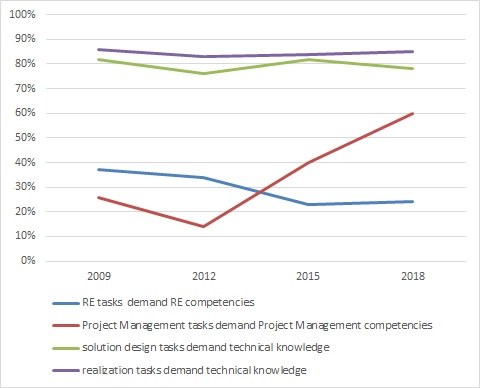
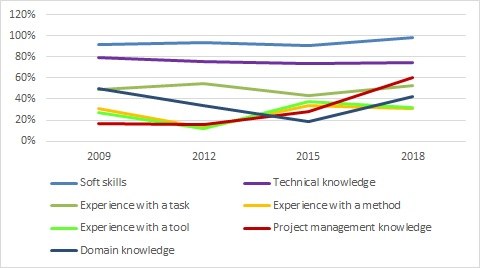
International differences
Similar studies were executed in multiple job markets: Germany [1], [2], [3], the Netherlands [4], Canada [5], Brazil and Mexico [6]. The results were very similar, as already indicated above. However, there are some differences. Canadian employers demand most frequently domain knowledge from the candidates regardless of whether the job title is cast as ‘engineer’, ‘analyst’ or ‘consultant’ [5]. Both in Canada and in the Netherlands job ads demand prior software engineering experience in a more technical role. The latter can positively influence downstream development (e.g. software architecture, software design), however, as suggested in [7], the danger in this case is that the requirements engineer “may begin to create a design when he should be developing requirements specifications”.
Trends from 2009 to 2018
The German study has been executed in 2009, 2012, 2015, and 2018 [1], [2], [3]. Based on this data, it could be possible to show trends with respect to the four questions investigated. However, clear trends were not easily visible. Rather, with respect to some numbers, fluctuation was observed. For instance, the requirements engineer position was increasingly sought after from 2009 to 2015 in what looked like a positive trend, but then, in 2018, the number dropped again to 0.6%.
When comparing the years with each other, it is difficult to see clear trends concerning the role that is most frequently tasked with RE (see Figure 1).
The number of tasks per position has grown slightly, but it is no clear trend. However, some tasks are now more frequently combined with RE. It seems that over the years those who perform RE increasingly do more project management, realization, documentation / training and feasibility analysis (see Figure 2).
RE competencies are demanded slightly less often in 2018 (Figure 3). Concerning the competencies beyond RE, only one trend is visible: The importance of project management knowledge has increased over time, from 17% in 2009 to 60% in 2018 of those ads which name project management tasks, as can be seen in Figure 4.
Figure 5 shows the in-demand RE competencies. The demand for specific modeling methods or tools decreased, and also the demand for RE knowledge in general. Lately, practical experience with RE was demanded most frequently.
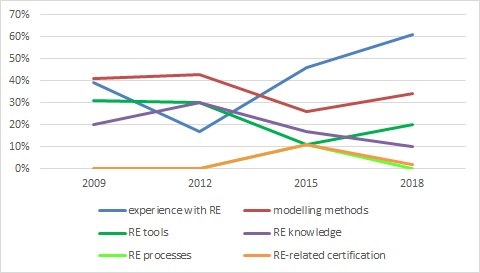
Some changes that we personally expected were in fact not observed. For example, there are still very few jobs with ‘Requirements Engineer’ or ‘Product Owner’ as a position title. One would expect that now that agile development is so widespread, qualified Product Owners would be searched for explicitly. However, this is not the case.
Furthermore, one would have hoped that in practice knowledge about RE methods and their application would have increased and consequently also the number of job postings searching for candidates with these qualifications. However, still very few specific RE competences or certifications are demanded from applicants.
Soft skills wanted!
Soft skills are a clear focus of the RE job ads. Over 90% of them demand soft skills (Figure 4). An average of five soft skills is demanded [1], [2], [3].
Table 1 compares the soft skills demanded in the job offers in different countries. As can be seen, there are many similarities across countries regarding the in-demand soft skills. However, there are also some differences. For example, in the Netherlands [4], three soft skills are also in demand, which were practically not found in the German study: communication in languages besides Dutch and English, displaying visionary/innovator’s attitude and being passionate. Some skills are highly required in Germany but less so in the Netherlands, such as ‘customer orientation’ and ‘willingness to travel’. In contrast, ‘result-orientation’ and ‘self-confidence’ receive more attention in the Netherlands than in Germany.
| ID | Competency/attitude | Identified in Germany (2013) [1] | Identified in the Netherlands (2015) [4] | Identified in Brazil and Mexico (2017) [6] | |
|---|---|---|---|---|---|
| 1 | |||||
| Language | English | ✓ | ✓ | — | |
| Native | ✓ | ✓ | ✓ | ||
| Others | — | ✓ | — | ||
| 2 | Teamwork skills | ✓ | ✓ | ✓ | |
| 3 | Communication skills | ✓ | ✓ | ✓ | |
| 4 | Analytical skills/thinking | ✓ | ✓ | ✓ | |
| 5 | Sense of responsibility | ✓ | ✓ | — | |
| 6 | Commitment | ✓ | ✓ | — | |
| 7 | Self-confidence | ✓ | ✓ | ✓ | |
| 8 | Result orientation | ✓ | ✓ | — | |
| 9 | Flexibility | ✓ | ✓ | ✓ | |
| 10 | Customer orientation | ✓ | ✓ | — | |
| 11 | Willingness to travel | ✓ | ✓ | ✓ | |
| 12 | Conceptual skills | ✓ | ✓ | — | |
| 13 | Self-organization | ✓ | ✓ | ✓ | |
| 14 | Visionary/Innovator | — | ✓ | ✓ | |
| 15 | Passionate | — | ✓ | ✓ | |
| 16 | Confidentiality | — | — | ✓ | |
| 17 | Convince | — | — | ✓ | |
| 18 | Empathy with users | — | — | ✓ | |
Table 1: Soft skills over country and year [8]
Figure 6 shows those soft skills explicitly demanded in the specific years in the German study. The soft skills often make up a large part of the ad´s competencies section. The average number of soft skills per advertisement was 5.6 in 2009, 7.8 in 2012, 4.9 in 2015 and 5.3 in 2018 (counting only those job ads where soft skills were mentioned). The most important soft skills in all years were English proficiency, communication skills and capacity for teamwork. In 2018 [3], German language knowledge and self-organization moved up among the top three soft skills.
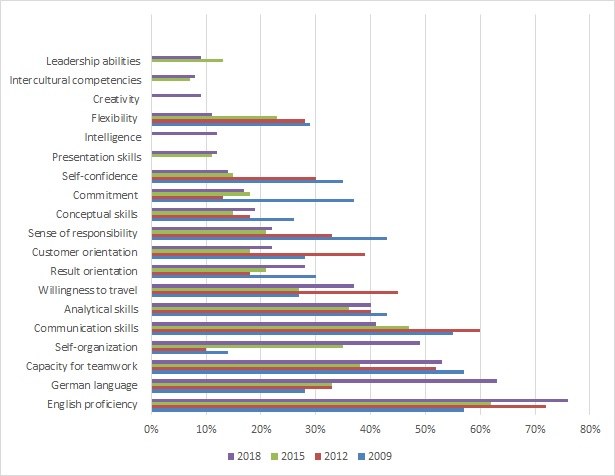
The results in Figure 6 corroborate findings from a 2018 focus group with RE practitioners from various countries [8]. Therein, communication skills were ranked as the ‘Number 1’ most critical skill for the professional occupation of RE. This study also notes that most of the soft skills included in RE job ads are not RE-specific but apply to any IT-related job. Plus, not all soft skills are equally critical to the successful execution of RE tasks. The significance of soft skills for a RE job varies based on context and organizational culture. For example, self-organization may not be important for people in RE roles if these people are working on projects where project managers do all the planning and coordination.
Conclusions for education and certification
The above results show how persons doing RE are employed in general, what their tasks will be and what qualifications are explicitly demanded. We propose here some conclusions which these findings suggest for education and certification of persons who do RE. These conclusions are general; in any particular organization the situation might be different.
Trainings must not only teach specific RE methods or tools, but also create engineers who can select appropriately and use any method and any tool for specific software projects.
Soft skills must be taught as far as possible. Case studies and role games can raise awareness for difficulties in communication, and courses can teach methods for communicating, leading a team, organizing oneself or creativity. However, personal traits like flexibility or passion probably cannot be taught.
Soft skills should also be tested in exams and certifications, for example using case study situations where the examinee must choose the most appropriate behavior.
Requirements engineering methods and their application seem to be in need of some marketing so that companies know that methods exist, apply them more and search for RE specialists who know them. Standards like the IREB’s Certified Professional for Requirements Engineering CPRE support the standardization of RE knowledge, and certificates allow the applicant to provide evidence of his / her RE knowledge.
In organizations where RE and solution design tasks are combined in one position, trainings must bridge the gap between requirements and technology: for example how to derive a database model in third normal form from a class diagram, domain-driven design and alike. Requirements engineering trainings for project managers, software designers/architects and testers would make sense too if they are expected to perform these tasks.
Summary and Outlook
This article presented results from different studies analyzing job ads seeking people to perform RE. The results show that there are still very few job ads for pure Requirements Engineer’s positions. The job title “Requirements Engineer” hardly exists and no-one is hired for doing RE exclusively. RE is mostly done by consultants, analysts and engineers, but also by programmers and project managers. Alongside RE tasks, these positions additionally include three or four other tasks that are not RE in nature, particularly in solution design, realization, quality assurance and / or project management.
Important preconditions for those doing RE are to have studied or attended vocational training, as well as work experience. However, specific RE knowledge is demanded explicitly only at 20-40%, often without naming specific methods, tools or standards in RE. Instead, about 80% of the RE jobs demand technical knowledge of programming languages, development tools and technologies. Other in-demand competencies are soft skills and previous experience with a specific task. The most important soft skills are English proficiency, communication skills and a capacity for teamwork.
Literature
- [1] D. Zowghi and C. Coulin, "Requirements elicitation: A survey of techniques, approaches, and tools," in Engineering and managing software requirements. Springer, 2005, pp. 19–46.
- [1] Herrmann A (2013) Requirements Engineering in Practice: There is no Requirements Engineer Position. REFSQ 2013 Conference, April 2013, Essen. Proceedings of REFSQ Requirements Engineering: Foundation for Software Quality, Lecture Notes in Computer Science Volume 7830, pp. 347-361.
- [2] Herrmann A., Weber M. (2016) Requirements Engineering in German Job Advertisements. Requirements Engineering Magazine, Issue 3, re-magazine.ireb.org/issues/03-an-eye-for-detail/requirements-engineering-in-german-job-advertisements
- [3] Herrmann, A. (2019) Die Arbeit im RequirementsEngineering im Spiegel von Stellenanzeigen. REConf, 12 March 2019, slides at hood-group.com/fileadmin/projects/hood-group/upload/Images/REConf/2019/Vortrags-PDFs/REConf2019_16_00_Herrmann_DieArbeitImRE.pdf
- [4] Daneva, M., Wang, C., Hoener, P. (2017) What the Job Market Wants from Requirements Engineers? An Empirical Analysis of Online Job Ads from the Netherlands. In Proc. of the 11th International Symposium On Empirical Software Engineering and Measurement (ESEM‘17), IEEE, November 9-10, Toronto, Canada, pp. 448-453.
- [5] Wang C., Cui, P., Daneva M., Kassab, M. (2018) Understanding what industry wants from requirements engineers: an exploration of RE jobs in Canada. In Proc. of 12th International Symposium on Empirical Software Engineering and Measurement (ESEM’18). ACM, Oulu, Finland, 41:1-41:10.
- [6] Calazans A., Paldês R., Masson Eloisa., et al. (2017) Software Requirements Analyst Profile: a descriptive study of Brazil and Mexico. Proceedings of the Requirements Engineering Conference 2017, pp. 196-204.
- [7] Laplante, P.A. (2013) Requirements engineering for software and systems. CRC Press.
- [8] Daneva M., Herrmann, A., Condori-Fernández N., Wang, C. (2019) Understanding the Most In-demand Soft Skills in Requirements Engineering Practice: Insights from Two Focus Groups, In Proc. of the Evaluation and Assessment on Software Engineering (EASE 2019), Copenhagen, Denmark, April 15-17, 2019, ACM, pp. 284-290.
Freelance trainer and consultant in Software Engineering. 20 years of work experience, including 7 years as consultant and project manager, 10 years in research and university teaching, and two guest professorships. Associate member at IREB, co-author of syllabus and handbook for the CPRE Advanced Level in Requirements Management. www.herrmann-ehrlich.de
Maya DanevaMaya Daneva, PhD, is Senior Member of Scientific Staff in the Services and Cybersecurity group at the University of Twente, the Netherlands. Her research interests are requirements engineering for large systems, security requirements engineering, requirements-based project estimation, user feedback analytics, and empirical research methods. Maya has a strong international exposure having spent two years of her career in Germany at the University of Saarbruecken and in the IDS Scheer, and 9 years as a business process analyst for SAP Enterprise Recourse Planning projects at TELUS Corporation, Canada’s second largest telecommunication company.
Chong WangChong Wang is an assistant professor at Wuhan University. She has over 10 years of work experience in research and university teaching. Her research interests include requirements engineering, software engineering, and service computing.
Nelly Condori-FernandezNelly Condori-Fernandez is an assistant professor at the Universidade da Coruna (Spain) and research associate of the Vrije Universiteit Amsterdam (The Netherlands). Her research focuses on topics related to quality requirements prioritization and sustainability. She has published 85 articles in indexed journals and ranked conferences. Besides, she has been involved in several European projects.